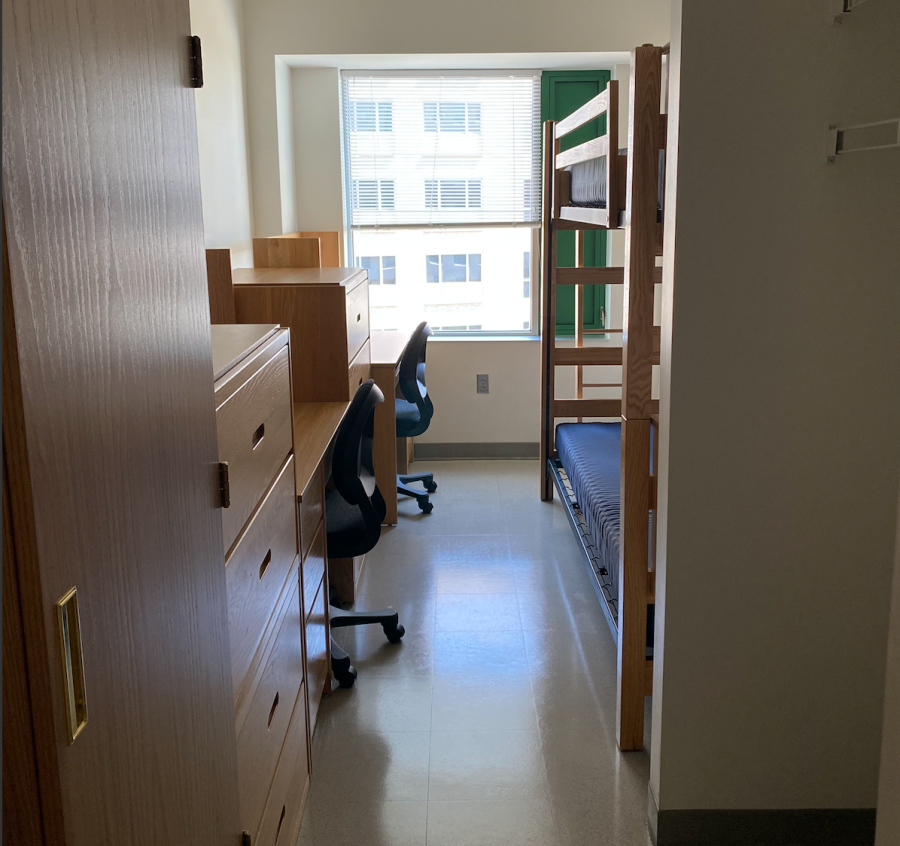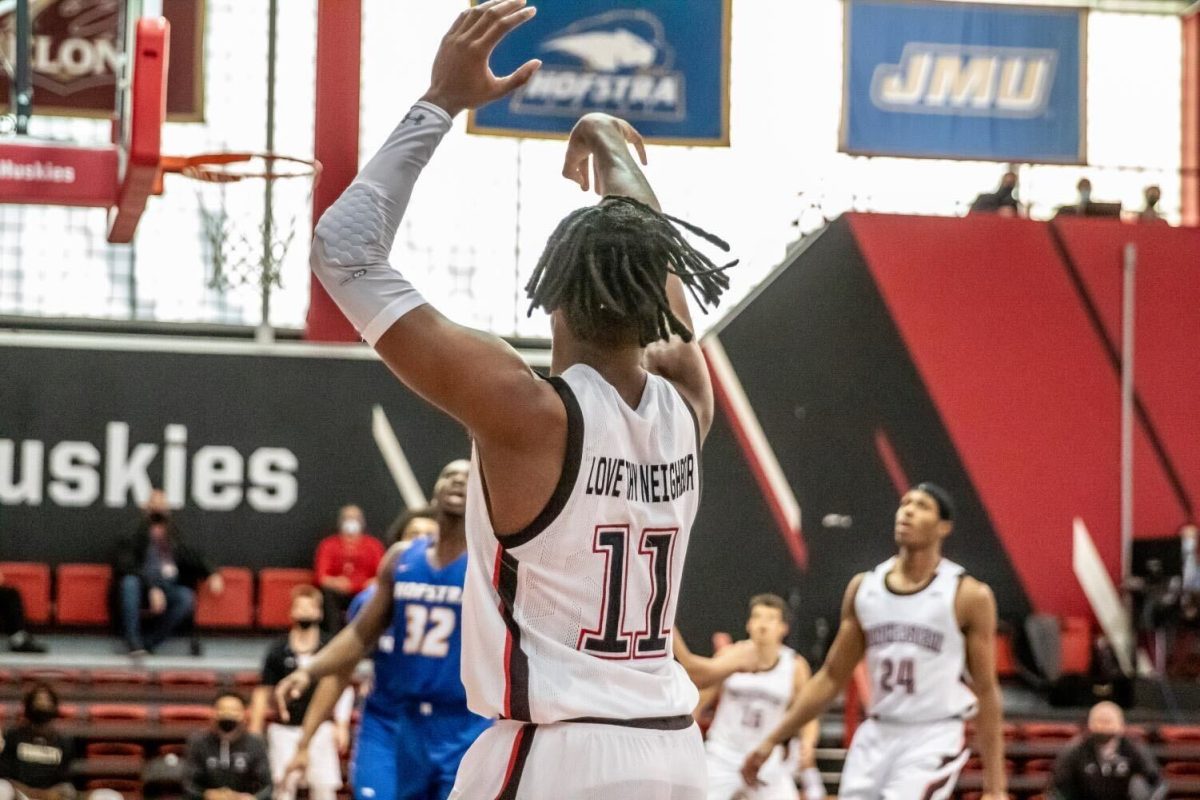Rising second-years face difficulties in housing selection process
Additional desks and dressers have been added to the forced doubles (shown here) and triples to increase work and storage space for residents. Photo courtesy of Stephen Triandafellos.
September 8, 2022
After Northeastern admitted nearly 1,000 more students than usual in 2021, the rising sophomore class is facing a shortage of apartment-style housing.
When students apply for on-campus housing, Northeastern assigns them a random lottery number that determines what order they choose housing — the lower the number, the earlier they get to pick housing and, theoretically, the better choices are available. This year, in order to ensure that all second-years are placed in university housing, even some students with low lottery numbers have been placed in suite or traditional dorm style housing, including in halls that were designated as first-year residencies last year, like International Village, or IV, and Kennedy Hall.
“Over 30% of the rising second-year class is or will be assigned to suite or traditional style housing,” Northeastern spokesperson Shannon Nargi wrote in an email statement to The News Aug. 9. “This is more consistent with historical housing trends for second-year classes than last year when the rising second-year class placements were affected by the larger first year class. While last year had first-year students living in International Village, with this year’s (Fall 2022) incoming class returning to a more traditional size, International Village is again housing for second and third year students.”
However, this does not mean these second-year students will be living in the same residence hall conditions that were offered to students from the previous years. Over the summer, the university added approximately 700 more beds to IV, converting singles into doubles and doubles into triples. Bunks beds have been installed in these residence halls in order to accommodate for the demand for extra bedspace.
This change in living space and quality was upsetting for some students who found out about the situation only after applying for second-year housing, including second-year chemical engineering and environmental engineering combined major Carmen Cheng, who will be living in IV.
“Being forced to be within a few feet of my roommate at all times, having to step around each other and our things will not cultivate the environment we need as students. If my [double] has the same amount of space as a single, I would want to avoid it entirely,” Carmen Cheng said.
Without a kitchen, living room or other amenities provided by apartment-style housing, the high price of suite-style and traditional housing further frustrates Carmen Cheng.
“The absurd price we are paying for such a small space — [living in International Village] costs almost as much as living in a standard apartment, but they have a considerably larger space and kitchen,” Carmen Cheng said. “In addition, those living in IV are forced to enroll in the costly meal plan.”
A single bedroom in IV, which is considered an enhanced suite-style, costs $6,560 per semester, while a single bedroom in any enhanced apartment-style accommodation with a kitchen and living room costs $7,985 a semester. Including the required meal plan for students living in housing without a kitchen, which is a minimum of $2,412 per semester, suite-style housing adds up to be at least $8,972 per semester — almost $1,000 more expensive than a similar quality apartment. Even the new triple rooms in IV ring up at $4,790 a semester, which is only $987 less expensive than a triple room in an apartment.
As a result of the difference in living conditions and options to previous years, some students, such as second-year mechanical engineering student Emma Tadeusiak, were shocked by the lack of residential choices they had once they reached their housing selection time slot.
“I thought it was going to be very easy and that I didn’t have to worry, but it ended up being super messy and unexpected,” Tadeusiak said.
With a lottery number in the high 5000s, Tadeusiak will be living in International Village this fall. Third-year business administration major Kevin Cheng said that in previous years a number in the 5000s was considered a decent number as the numbers for second-years ranged from 5001-9375 for the previous school year.
According to Northeastern’s fall and spring housing selection website, any multi-person group must fill a vacant apartment of the same size as the group. For a group of three, the system will not allow them to occupy spaces in a five-person apartment.
Lauren Kaufmann, a second-year psychology and criminal justice combined major, was anticipating living in 780 Columbus or 10 Coventry St., which are both standard apartment-style accommodations. With a number in the 5000s, Kaufmann said she and her roommate thought they would at least have a chance to live in these apartments because they were not as popular as the Davenport and West Village residence halls in the previous years.
When it was time for Kaufmann to choose housing, she said she realized all the apartments were taken, leading her and her roommate to find housing via Placement Assistance With Staff, or PAWS.
PAWS is a process in which the university places students in housing that becomes available after the initial housing selection time due to other students studying abroad, taking co-op opportunities outside of Boston or securing off-campus housing. When going through PAWS, students must fill out a preference form to indicate what type of accommodation they desire, which includes living in a traditional room, suite or apartment.
On the preference form, Kaufmann and her roommate indicated that they wanted an apartment, mainly for the kitchen.
“I am going to be on co-op during the spring, I can’t be dependent on a campus meal plan if I am going to be off campus,” Kaufmann said.
Despite not being put into an apartment, Kaufmann believes that Northeastern did the best it could this summer.
“I know that I cannot say that [the situation] is unfair because there is nothing much they can do. It’s not like the Boston housing market has tons of open apartment buildings [for the university to lease out to their students] but it is upsetting to be told for so long that it would be so great to have a kitchen, which made me want to get one, especially as someone who loves baking,” Kaufmann said.
Carmen Cheng said she believes Northeastern students are currently facing the consequences of the university’s over enrollment in previous years, and that Northeastern should’ve done a better job at communicating information about the resulting housing changes to students.
“While completing housing, I definitely felt that Northeastern did not do a good job with their housing because the lack of places was shocking, and I think it was that way for a lot of people,” Tadeusiak said.
Like Tadeusiak, Kaufmann said she thought that Northeastern did not relay enough information to their students during the spring semester, when students started the housing process. She said had known the situation that she is currently in, she would’ve chosen a different group with a better housing number.
“I would have planned differently had I known this would be an issue,” Kaufmann said. “They definitely should’ve said [something about the situation] earlier.”







